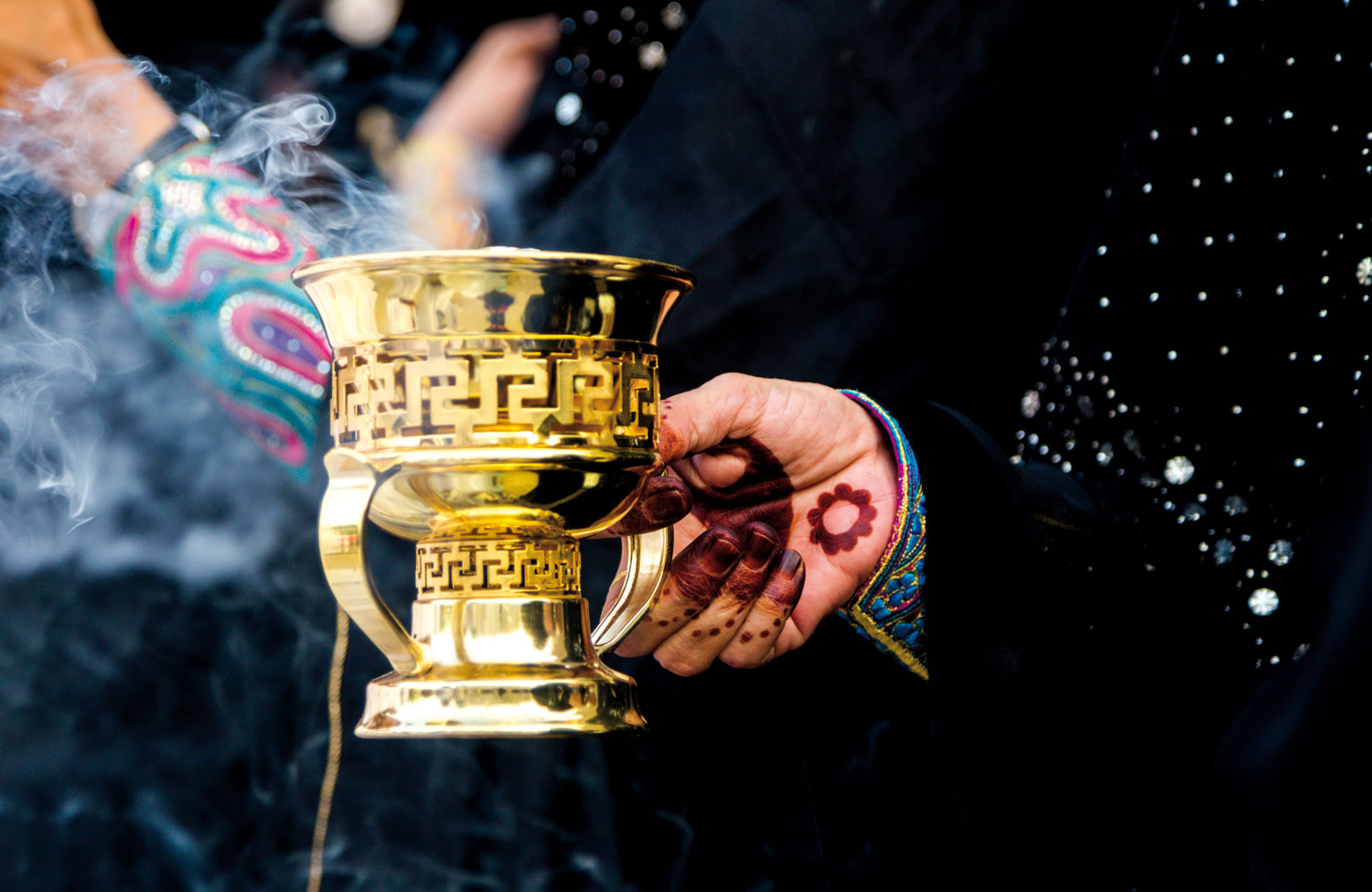

An overwhelming olfactory sensation, an Omani home is incomplete without the distinctive smell of incense or bakhoor. The women of the house as a part of their daily chores are sure to burn frankincense, famously found in the Governorate of Dhofar, to not only cleanse the air, but also refresh and re-odourise their homes. You will find these unique and pleasant smells that enlighten your spirits in all Omani homes where they are also frequently used in religious and public events such as holidays, weddings and social events.
Many Omani women have started taking their skills and becoming specialists in preparing different Omani incense, even going as far as setting up small businesses and selling their products out of their homes, in local markets and in shopping malls. Their products have become popular amongst citizens and visitors, where incense is one of the most important gifts that tourists and expatriates are keen to buy from the Omani markets.
“Omani incense varies in prices due to the quantity as well as the materials that enter into the manufacture of each type because there are some expensive materials that produce incense with distinctive smell,” said Attiya al Hinai, who is about 50 years old. “Some recipes are confidential and can’t be shared with others,” she added.
economic activity
Incense industry has been an integral part of Oman’s economy, especially in the Dhofar Governorate where since ancient times the preparation, collection and selling of frankincense and other incense items have been a source of income for many families for generations. Different communities developed different recipes and created a variety to fit the tastes of many people and Arab perfume lovers. To this day, frankincense has continued to be an important economic commodity, generating luxurious financial returns for its producers.
Historical sources have confirmed that Dhofar has been known for the incense trade since the Stone era and the modern era, where the Dhofar’s incense has played a prominent role in commercial activities between the old regions and different civilisations.
Historical presence

“Oliban” in particular, which is a popular incense known amongst Omani people because of the spread of its trees in Dhofar, had a monumental historical presence that made it a bridge between the civilisations of the ancient world more than 7,000 years ago. For this reason, commercial caravans moved on arduous routes from Oman to Iraq, Syria, ancient Egypt and Palestine. Because the incense industry has flourished and expanded, the industry of the vessels in which incense is burned also flourished. Locally called “Almebkharah or Majmer”. This craft is one of the most important industries in the Omani heritage that produced manually by Omani women or men, in different governments of the Sultanate, especially in Dhofar, and in various shapes, designs and colours.
Almebkharah is a beautiful traditionally clay vessel, which commonly has a circular or square base that is supported by columns on several sides. The middle of the columns hosts a square-shaped space to perfectly fit the burning coal. Just add a handful of the white frankincense crystals and watch as the smoke engulfs its surrounding area leaving behind its fresh and aromatic unique scent.
Many experts of the trade believe that the industry faces major dangers especially in the Sultanate and in and around the Arabian Gulf, one being the invasion of chemically treated, cheaper alternatives that have been connected to containing toxins and carcinogens, leading to long-term health problems, congenital defects and respiratory disorders. Many scientific studies have also warned users of the dangers of burning incense, linking it to respiratory issues like asthma, concluding that children living in houses whose owners used to burn incense are more likely to have asthma. Recent studies have shown that burning incense can lead to serious damage when used in excessive quantities and continuously, where its effect is more than the effect of smoking or exhaust cars in crowded and closed places.
Experts agree that the continued use of incense indoors should be discouraged. Whilst the careful use of the product is safe in crowded rooms with bad ventilation, a room may fill up with smoke which can cause issues due to long-term exposure. The experts say if someone wants to spread the incense somewhere, it is best to burn it when the place is empty, and before people reach, the place is ventilated and the incense was stopped smoking.
innovation
On the other hand, those suffering from respiratory diseases and asthma should not be exposed to or directly inhale incense. A smart innovation that can be found is an incense burner that was invented by “Ghaym Student Company” from Sultan Qaboos University which participated in the Injaz Oman competition. It works to filter out the smoke produced by incense.
Incense smoke is considered as one of the causes of asthma and respiratory diseases spread throughout the Sultanate. “Our product works to reduce the produced smoke to more than 70 per cent, which means that it can be used in different places equipped with fire alarms, the burner also reduces the escalation of carbon dioxide with smoke by 90 per cent, in addition to reducing the proportion of gasoline gas by 0.0035 per cent,” said Saleh al Saeedi, Executive Director of the company.
safer design
The design of this Almebkharah is safer than the traditional one. “It contains a metal plate that prevents the coal from falling on the ground when the Almebkharah falls in order to reduce fires caused by the use of incense,” he said. “Product life expectancy is five years, but the filter needs constant change. It expected to be in the shops selling incense before Eid al Adha, and the expected price is between RO 6-10, but now the company will receive orders and deliver the product,” he added.
RUQAYA AL KINDI
Oman Observer is now on the WhatsApp channel. Click here



